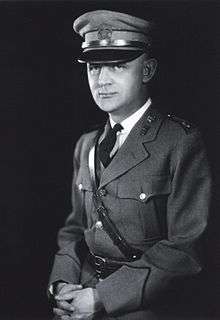John Friend Mahoney
| John Friend Mahoney | |
|---|---|
 | |
| Commissioner of the New York City Department of Health | |
|
In office 1950–1953 | |
| Preceded by | Harry S. Mustard |
| Succeeded by | Leona Baumgartner |
| Personal details | |
| Born |
August 1, 1889 Fond du Lac, Wisconsin, U.S. |
| Died | February 23, 1957 (aged 67) |
| Resting place | Arlington National Cemetery |
| Alma mater | Marquette University (MD) |
| Awards | Lasker Award (1946) |
| Military service | |
| Allegiance |
|
| Service/branch |
|
John Friend Mahoney (August 1, 1889 – February 23, 1957) was an American physician best known as a pioneer in the treatment of syphilis with penicillin. He won the 1946 Lasker Award.
Early life and education
The son of David and Mary Ann Mahoney,[1] John Friend Mahoney was born on August 1, 1889 in Fond du Lac, Wisconsin. In 1914 Mahoney graduated from Marquette University with attached clinical training at the Milwaukee County Hospital and at the Chicago Lying-in Hospital.
Career
From 1917 he worked as an assistant surgeon in the US forces in Europe during World War II. After returning in 1919, he served in the United States Public Health Service on various quarantine stations and marine hospitals, including Ellis Island. In this context, it was from 1925 to 1929 that he was sent to Europe. While in England, Ireland, and Germany, Mahoney studied syphilis treatment.
Since 1929 Mahoney was Director of the Venereal Disease Research Laboratory of the Food and Drug Administration. The laboratory improved serological tests for syphilis and demonstrated, with the advent of sulfonamide treatment in the United States in the 1930s, its efficiency in gonorrhea. He was also Medical Director of the Marine Hospital in Staten Island.
Mahoney was made aware of the possibilities of penicillin treatment by a paper of Wallace Herrell and colleagues from the Mayo Clinic. Particular attention was on the treatment of gonorrhea patients where the pathogen was resistant to sulfonamides. Mahoney could confirm this and also began to test penicillin for syphilis, first in vitro without success, then in rabbits. Once this had been successful he began clinical trials. He presented at a meeting of the American Public Health Association in New York in October 1943 the first results in four patients in the early stages of the disease. Time reported the findings. With Mahoney's involvement, the Committee on Medical Research began an extensive clinical trial with over 1400 patients in different hospitals. Mahoney led the study at the Staten Island Marine Hospital. In June 1944 penicillin was introduced as a standard treatment for syphilis in the United States Army.
In 1946 Mahoney was one of the first winners of the Lasker Award. In 1948 he was Chairman of the World Health Organization Expert Committee on Venereal Diseases at its first meeting in Geneva. In December 1949 he retired from the Public Health Service. In 1950 he was appointed Commissioner of the New York City Department of Health, serving until 1953.[2] Until his death, he was director of the laboratories of the municipal health authorities of New York.
Personal life
He was married and had two sons.
References
- ↑ "Funeral Set for Former City Resident". Fond du Lac Commonwealth Reporter. March 6, 1971. p. 20. Retrieved September 28, 2016 – via Newspapers.com.

- ↑ "NYC Making Free Blood Tests in Drive on Venereal Disease". The La Crosse Tribune. May 3, 1953. p. 28. Retrieved September 28, 2016 – via Newspapers.com.

Bibliography
- John Parascandola: John Mahoney and the introduction of penicillin to treat syphilis
- Obituary in the British Journal of Venereal Diseases (PDF), Band 33, 1957, S. 127.